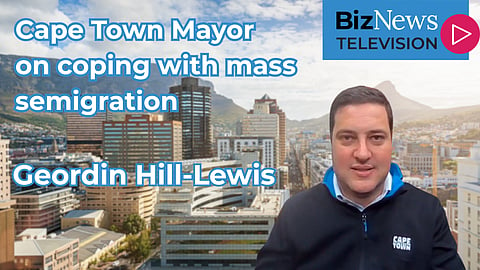CT Mayor GHL on coping with mass semigration, CT rating upgrade, Trojan horses, working with the US
One of the brightest stars in South Africa’s political firmament, 38-year-old Geordin Hill-Lewis opens up here on how his current responsibility - the City of Cape Town - is surprising everyone on the upside. The executive mayor celebrated a huge win this week after getting ratings agencies to differentiate between his city and its South African peers: something the former shadow Minister of Finance has pursued for years because of the massive impact lower borrowing costs bring. In this interview with BizNews editor Alec Hogg he also addresses Frans Cronje’s warning about embracing possible political Trojan Horses (CT’s ANC and EFF leaders recently crossed to the DA); and shares why he’d do whatever necessary to earn Cape Town a ‘free pass’ from Washington.
Sign up for your early morning brew of the BizNews Insider to keep you up to speed with the content that matters. The newsletter will land in your inbox at 5:30am weekdays. Register here.
Support South Africa’s bastion of independent journalism, offering balanced insights on investments, business, and the political economy, by joining BizNews Premium. Register here.
If you prefer WhatsApp for updates, sign up to the BizNews channel here.
Watch here
Listen here
BizNews Reporter
Geordin Hill-Lewis, at just 38 years old, is emerging as one of the most promising political figures in South Africa. Currently serving as the Executive Mayor of Cape Town, he has quickly gained a reputation for capable and forward-thinking leadership. In this interview with BizNews editor Alec Hogg, Hill-Lewis offers insight into how Cape Town is defying national trends and becoming a standout example of effective governance.
Cape Town’s ratings breakthrough
One of the major highlights of Hill-Lewis’s tenure is the city’s recent achievement in securing differentiated credit ratings. For the first time, ratings agencies have acknowledged that Cape Town should not be financially assessed in the same way as other South African cities, many of which suffer from poor fiscal management. This breakthrough means Cape Town can now access capital markets on better terms, significantly lowering its borrowing costs. These savings will ultimately benefit residents through improved infrastructure and service delivery.
A long-term vision realised
Hill-Lewis’s push for differentiated ratings was not a short-term effort. As a former shadow Minister of Finance, he has long understood the importance of fiscal independence and credibility. The recent success is the result of years of focused effort to position Cape Town as a city with sound financial policies, transparency, and governance. It underscores how strategic thinking and consistency can produce meaningful results even within the broader challenges of South African politics.
Read more:
Addressing the Trojan Horse warning
The conversation also turns to a caution raised by political analyst Frans Cronje regarding recent defections from the ANC and EFF to the DA. Cape Town has seen prominent opposition figures switching allegiance to the DA, prompting concerns about hidden motives and the potential infiltration of conflicting ideologies. Hill-Lewis addresses these concerns directly, acknowledging the risks while emphasizing the DA’s internal safeguards and commitment to its core values. His response reflects a cautious but pragmatic approach to political realignment in a fluid national environment.
Protecting Cape Town’s global standing
Hill-Lewis reveals his intention to do whatever it takes to shield Cape Town from the negative consequences of poor national policies. Specifically, he refers to the idea of securing a “free pass” from Washington, essentially working to ensure that international partners, especially the United States, continue to view Cape Town as a reliable and investment-friendly city, even if South Africa as a whole moves in a less favourable direction. This reveals the mayor’s broader ambition: to position Cape Town not just as a well-run South African city, but as a globally respected urban centre.
Conclusion: A model for the nation’s future?
The interview concludes with a sense that Hill-Lewis’s success in Cape Town may serve as a model for what effective leadership could look like at a national level. His mix of financial acumen, political realism, and visionary planning places him at the centre of the DA’s future prospects. Whether or not he pursues a larger role in South African politics, his work in Cape Town is already making a strong case for the power of competent, values-driven leadership.

